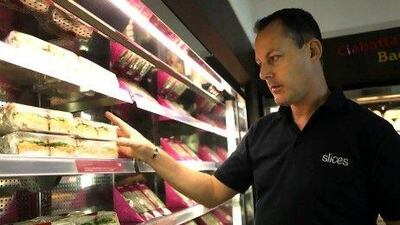When it comes to encouraging his patrons to consider the environment, Darrell Guest has one weapon - humour.
"If they ask me for carrier bags, I joke and say no," said the Briton who arrived in Abu Dhabi 17 months ago to launch and manage Slices, a chain of organic bistros, the first of which opened on January 2.
The joke is Mr Guest's reminder that once used, bags become waste and that often, items are already packaged so well that an extra bag is unnecessary.
It is a refreshing attitude in a country where the hungry diner often faces a lengthy obstacle course before takeaway food can actually be consumed. Inside the bag is a box, inside the box is a plastic container, inside the container is some cling wrap and inside the cling wrap is the food.
Such over-packaging is a problem experts are all too familiar with.
"I am concerned about the way we look at food packaging and other forms of packaging," said Meerah Taryam, awareness and education manager at the Sharjah waste management company, Bee'ah.
It is hard to put an exact figure on how much unnecessary waste is created by restaurants and supermarkets, she said, but anecdotal evidence suggests there are plenty of opportunities to save.
"Whenever you order food from a restaurant, there is an excessive amount of packaging that comes with it," she said. "You are kept busy opening all the different bags and boxes."
At supermarkets too "we have developed this culture where the food we buy needs to come wrapped in plastic and paper", she said.
While avoiding all packaging is not possible, responsible companies can ensure that the packaging they use is sustainable. This is what Mr Guest does. Boxes at Slices are made of recycled paper and so are cups, which are also lined with a thin layer of a biodegradable polymer inside. Cup lids are also made of the eco-polymer, obtained from sugar cane.
"I do not like plastic, I never have," said Mr Guest. "It is not good for the planet."
But sourcing the right packaging is not easy. Mr Guest gets his from Taiwan as there is no local supplier. His order not only takes longer to arrive, but must also be made in bulk - a minimum of 25,000 items at a time.
Yet Slices is an exception in the UAE, where most takeaway restaurants use plastic. The reason is cost, said Mr Guest. For example, one of the coffee cups used at his restaurants costs Dh1 - but just one third of a fils for a polystyrene cup.
"Plastic is cheap. It is easier to get hold of, customise and design and it is easy to manufacture," he said.
Nils El Accad, chief executive officer of the Organic Foods and Cafe, the country's first supermarket for organic products, expressed a similar opinion.
"[Sustainable packaging] is more expensive and it is a lot of work getting it. It is not easily available, you have to search for it," said Mr El Accad. "Plastic bags - the guys come around all the time, trying to get your business."
Mr El Accad tries to avoid plastic as much as possible in his stores, only using it at the fruit and vegetable counter and for meat trays. In 2005 he became the first company owner in the country to introduce reusable shopping bags. Customers who come without one have to pay 75 fils for a large bag made out of recycled paper.
"Some of them are not very happy but some think it is a good idea. You always have both sides," he said.
His stores also reuse the cardboard boxes that products are packed in. Once the products are unpacked and placed on the supermarket shelves, the boxes are placed at the till and given to customers free.
Reusing the boxes is common in European shops and "does not take a lot of effort", he said. "All retailers should do that. Why they do not do it, who knows," he said.
"Change starts with yourself. It is a lot easier not to change than to do it. But if someone really wants to, they will change."

